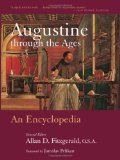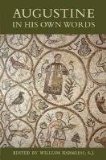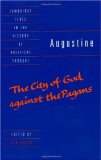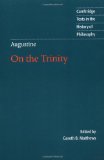|
Relevant
books
available at Amazon
Many Augustine
translations
and studies with links to Amazon
A selection below
 
Peter Brown biography
--------
 
Allan Fitzgerald --------
 
Henry Chadwick
a short indroduction --------
 
William Harmless.
Extracts from several of Augustine's main works --------
 
Henry Chadwick's translation of "Confessions" --------
 
R.W.Dyson's translation of "The City of God" --------
 
R.P.H. Green's translation of "On Christian Teaching" --------
 
Gareth Matthews' translation of "On The Trinity" (books 8 - 15) |
5. You are of opinion that no one should be compelled to follow
righteousness; and yet you read that the householder said to his servants,
“Whomsoever ye shall find, compel them to come in.” You also read how he who was
at first Saul, and afterwards Paul, was compelled, by the great violence with
which Christ coerced him, to know and to embrace the truth; for you cannot but
think that the light which your eyes enjoy is more precious to men than money or
any other possession. This light, lost suddenly by him when he was cast to the
ground by the heavenly voice, he did not recover until he became a member of the
Holy Church. You are also of opinion that no coercion is to be used with any man
in order to his deliverance from the fatal consequences of error; and yet you
see that, in examples which cannot be disputed, this is done by God, who loves
us with more real regard for our profit than any other can; and you hear Christ
saying, “No man can come to me except the Father draw him,” which is done in the
hearts of all those who, through fear of the wrath of God, betake themselves to
Him. You know also that sometimes the thief scatters food before the flock that
he may lead them astray, and sometimes the shepherd brings wandering sheep back
to the flock with his rod.
6. Did not Sarah, when she had the power, choose rather to afflict the insolent
bondwoman? And truly she did not cruelly hate her whom she had formerly by an
act of her own kindness made a mother; but she put a wholesome restraint upon
her pride. Moreover, as you well know, these two women, Sarah and Hagar, and
their two sons Isaac and Ishmael, are figures representing spiritual and carnal
persons. And although we read that the bondwoman and her son suffered great
hardships from Sarah, nevertheless the Apostle Paul says that Isaac suffered
persecution from Ishmael: “But as then he that was born after the flesh
persecuted him that was born after the Spirit, even so it is now;” whence those
who have understanding may perceive that it is rather the Catholic Church which
suffers persecution through the pride and impiety of those carnal men whom it
endeavours to correct by afflictions and terrors of a temporal kind. Whatever
therefore the true and rightful Mother does, even when something severe and
bitter is felt by her children at her hands, she is not rendering evil for evil,
but is applying the benefit of discipline to counteract the evil of sin, not
with the hatred which seeks to harm, but with the love which seeks to heal. When
good and bad do the same actions and suffer the same afflictions, they are to be
distinguished not by what they do or suffer, but by the causes of each: e.g.
Pharaoh oppressed the people of God by hard bondage; Moses afflicted the same
people by severe correction when they were guilty of impiety: their actions were
alike; but they were not alike in the motive of regard to the people’s
welfare,—the one being inflated by the lust of power, the other inflamed by
love. Jezebel slew prophets, Elijah slew false prophets; I suppose that the
desert of the actors and of the sufferers respectively in the two cases was
wholly diverse.
7. Look also to the New Testament times, in which the essential gentleness of
love was to be not only kept in the heart, but also manifested openly: in these
the sword of Peter is called back into its sheath by Christ, and we are taught
that it ought not to be taken from its sheath even in Christ’s defence. We read,
however, not only that the Jews beat the Apostle Paul, but also that the Greeks
beat Sosthenes, a Jew, on account of the Apostle Paul. Does not the similarity
of the events apparently join both; and, at the same time, does not the
dissimilarity of the causes make a real difference? Again, God spared not His
own Son, but delivered Him up for us all. Of the Son also it is said, “who loved
me, and gave Himself for me;” and it is also said of Judas that Satan entered
into him that he might betray Christ. Seeing, therefore, that the Father
delivered up His Son, and Christ delivered up His own body, and Judas delivered
up his Master, wherefore is God holy and man guilty in this delivering up of
Christ, unless that in the one action which both did, the reason for which they
did it was not the same? Three crosses stood in one place: on one was the thief
who was to be saved; on the second, the thief who was to be condemned; on the
third, between them, was Christ, who was about to save the one thief and condemn
the other. What could be more similar than these crosses? what more unlike than
the persons who were suspended on them? Paul was given up to be imprisoned and
bound, but Satan is unquestionably worse than any gaoler: yet to him Paul
himself gave up one man for the destruction of the flesh, that the spirit might
be saved in the day of the Lord Jesus. And what say we to this? Behold, both
deliver a man to bondage; but he that is cruel consigns his prisoner to one less
severe, while he that is compassionate consigns his to one who is more cruel.
Let us learn, my brother, in actions which are similar to distinguish the
intentions of the agents; and let us not, shutting our eyes, deal in groundless
reproaches, and accuse those who seek men’s welfare as if they did them wrong.
In like manner, when the same apostle says that he had delivered certain persons
unto Satan, that they might learn not to blaspheme, did he render to these men
evil for evil, or did he not rather esteem it a good work to correct evil men by
means of the evil one?
8. If to suffer persecution were in all cases a praiseworthy thing, it would
have sufficed for the Lord to say, “Blessed are they which are persecuted,”
without adding “for righteousness’ sake.” Moreover, if to inflict persecution
were in all cases blameworthy, it would not have been written in the sacred
books, “Whoso privily slandereth his neighbour, him will I persecute [cut off,
E.V.].” In some cases, therefore, both he that suffers persecution is in the
wrong, and he that inflicts it is in the right. But the truth is, that always
both the bad have persecuted the good, and the good have persecuted the bad: the
former doing harm by their unrighteousness, the latter seeking to do good by the
administration of discipline; the former with cruelty, the latter with
moderation; the former impelled by lust, the latter under the constraint of
love. For he whose aim is to kill is not careful how he wounds, but he whose aim
is to cure is cautious with his lancet; for the one seeks to destroy what is
sound, the other that which is decaying. The wicked put prophets to death;
prophets also put the wicked to death. The Jews scourged Christ; Christ also
scourged the Jews. The apostles were given up by men to the civil powers; the
apostles themselves gave men up to the power of Satan. In all these cases, what
is important to attend to but this: who were on the side of truth, and who on
the side of iniquity; who acted from a desire to injure, and who from a desire
to correct what was amiss?...
16. You now see therefore, I suppose, that the thing to be considered when any
one is coerced, is not the mere fact of the coercion, but the nature of that to
which he is coerced, whether it be good or bad: not that any one can be good in
spite of his own will, but that, through fear of suffering what he does not
desire, he either renounces his hostile prejudices, or is compelled to examine
truth of which he had been contentedly ignorant; and under the influence of this
fear repudiates the error which he was wont to defend, or seeks the truth of
which he formerly knew nothing, and now willingly holds what he formerly
rejected. Perhaps it would be utterly useless to assert this in words, if it
were not demonstrated by so many examples. We see not a few men here and there,
but many cities, once Donatist, now Catholic, vehemently detesting the
diabolical schism, and ardently loving the unity of the Church; and these became
Catholic under the influence of that fear which is to you so offensive by the
laws of emperors, from Constantine, before whom your party of their own accord
impeached Cæcilianus, down to the emperors of our own time, who most justly
decree that the decision of the judge whom your own party chose, and whom they
preferred to a tribunal of bishops, should be maintained in force against you.
17. I have therefore yielded to the evidence afforded by these instances which
my colleagues have laid before me. For originally my opinion was, that no one
should be coerced into the unity of Christ, that we must act only by words,
fight only by arguments, and prevail by force of reason, lest we should have
those whom we knew as avowed heretics feigning themselves to be Catholics. But
this opinion of mine was overcome not by the words of those who controverted it,
but by the conclusive instances to which they could point. For, in the first
place, there was set over against my opinion my own town, which, although it was
once wholly on the side of Donatus, was brought over to the Catholic unity by
fear of the imperial edicts, but which we now see filled with such detestation
of your ruinous perversity, that it would scarcely be believed that it had ever
been involved in your error. There were so many others which were mentioned to
me by name, that, from facts themselves, I was made to own that to this matter
the word of Scripture might be understood as applying: “Give opportunity to a
wise man, and he will be yet wiser.” For how many were already, as we assuredly
know, willing to be Catholics, being moved by the indisputable plainness of
truth, but daily putting off their avowal of this through fear of offending
their own party! How many were bound, not by truth—for you never pretended to
that as yours—but by the heavy chains of inveterate custom, so that in them was
fulfilled the divine saying: “A servant (who is hardened) will not be corrected
by words; for though he understand, he will not answer”! How many supposed the
sect of Donatus to be the true Church, merely because ease had made them too
listless, or conceited, or sluggish, to take pains to examine Catholic truth!
How many would have entered earlier had not the calumnies of slanderers, who
declared that we offered something else than we do upon the altar of God, shut
them out! How many, believing that it mattered not to which party a Christian
might belong, remained in the schism of Donatus only because they had been born
in it, and no one was compelling them to forsake it and pass over into the
Catholic Church!
18. To all these classes of persons the dread of those laws in the promulgation
of which kings serve the Lord in fear has been so useful, that now some say we
were willing for this some time ago; but thanks be to God, who has given us
occasion for doing it at once, and has cut off the hesitancy of procrastination!
Others say: We already knew this to be true, but we were held prisoners by the
force of old custom: thanks be to the Lord, who has broken these bonds asunder,
and has brought us into the bond of peace! Others say: We knew not that the
truth was here, and we had no wish to learn it; but fear made us become earnest
to examine it when we became alarmed, lest, without any gain in things eternal,
we should be smitten with loss in temporal things: thanks be to the Lord, who
has by the stimulus of fear startled us from our negligence, that now being
disquieted we might inquire into those things which, when at ease, we did not
care to know! Others say: We were prevented from entering the Church by false
reports, which we could not know to be false unless we entered it; and we would
not enter unless we were compelled: thanks be to the Lord, who by His scourge
took away our timid hesitation, and taught us to find out for ourselves how vain
and absurd were the lies which rumour had spread abroad against His Church: by
this we are persuaded that there is no truth in the accusations made by the
authors of this heresy, since the more serious charges which their followers
have invented are without foundation. Others say: We thought, indeed, that it
mattered not in what communion we held the faith of Christ; but thanks to the
Lord, who has gathered us in from a state of schism, and has taught us that it
is fitting that the one God be worshipped in unity.
|

